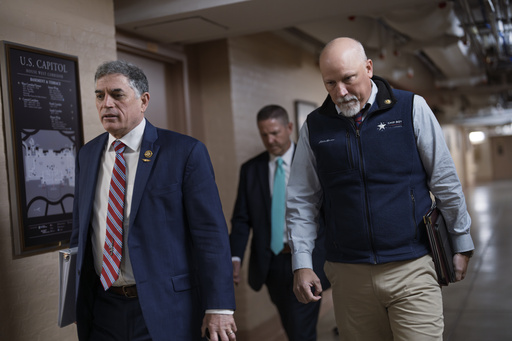WASHINGTON — In response to recent warnings from President Donald Trump’s border advisor, Senate Republicans announced plans on Tuesday to expedite a budget proposal aimed at approving around $340 billion for enhanced border security and defense initiatives.
In a parallel effort, House Republicans are preparing to introduce their own budget proposal, with hopes of revealing it as early as Wednesday. This plan is expected to extend the tax cuts enacted during Trump’s initial term, emphasizing the urgency of fiscal measures that align with the administration’s agenda.
Members of the GOP Senate caucus expressed a strong desire to advance critical components of Trump’s domestic policy. On Tuesday, the Senate heard from Russ Vought, head of the White House Office of Management and Budget, and Tom Homan, the former acting director of U.S. Immigration and Customs Enforcement, who is now advising Trump in his second term. Both underscored the pressing need for additional funding for border operations.
“Right now, we aren’t just constructing barriers; we are facing significant roadblocks,” asserted Sen. Lindsey Graham, the Republican chairman of the Senate Budget Committee. “The funding is essential, and it is needed without delay.”
The Senate Budget Committee aims to deliberate on the spending plan for border security and defense over the coming Wednesday and Thursday sessions. The proposed budget allocates as much as $175 billion for the Senate Committee on Homeland Security and Government Affairs and up to $150 billion for the Senate Armed Services Committee.
Graham mentioned that other committees would be tasked with identifying expenditure cuts from different government sectors to finance the proposed enhancements in border security and defense. However, he refrained from specifying any particular programs, stating that there are numerous potential areas for reductions.
“I am hopeful that the authorizing committees have carefully considered where they can achieve cost savings,” Graham noted.
The Senate’s strategy anticipates that the increased defense and border spending will be implemented over a four-year period, with funding for the initiatives being secured within that time frame, according to Graham’s comments.
Democrats have expressed concerns that the Republicans’ budget plans might target Medicaid, a program that provides critical health coverage for low-income individuals, to achieve the necessary savings.
“Senate Democrats will fiercely oppose any cuts to Medicaid that could result in higher costs and reduced healthcare access for hardworking Americans,” stated Sen. Ron Wyden, a Democrat from Oregon, following the budget plan’s unveiling by Graham.
Since last year, Republican lawmakers have debated the optimal approach to enact Trump’s legislative priorities, whether through single comprehensive bills or multiple pieces. Currently, the Senate seems to be pursuing a dual-bill route, while the House is inclined toward a single-bill format. The final outcome remains uncertain as both chambers move forward.
House Speaker Mike Johnson indicated that the budget plan details might be released on Tuesday evening. Nonetheless, Majority Leader Steve Scalise later suggested that the details would likely become available on Wednesday, with the House Budget Committee set to vote on Thursday.
This timeline lags slightly behind the ambitious schedule Johnson had proposed back in January, even as he asserts that the chamber remains aligned with its intended timeline.
The crafting of these budget proposals represents just an initial phase in a complex and lengthy legislative journey. This step is crucial for enabling Republicans to pass laws independently if faced with unanimous opposition from Democrats.
The reconciliation process, which allows legislation to bypass certain procedural hurdles, was successfully employed by Republicans in 2017 for tax cuts. Democrats utilized this method twice under President Biden, first for a significant COVID relief package in 2021 and then for an extensive climate and healthcare initiative in 2022.
Leaders among House Republicans argue that bundling Trump’s goals into a single legislative measure would facilitate their passage. Conversely, Republican senators express tentative support for this strategy but harbor doubts about its feasibility. Given their slim majority in the House, unifying behind legislation has proven to be a challenge for Republican leaders.
In the previous Congress, the Republican Party faced stark divisions that culminated in eight GOP members aligning with Democrats to vote out House Speaker Kevin McCarthy, an extraordinary occurrence.
“While we appreciate the House’s ongoing efforts, they seem to be bogged down, and we cannot afford to waste any more time. We must secure the funding the president needs to bolster border security,” remarked Sen. Ron Johnson, a Republican from Wisconsin. “We have waited long enough; our time is running out.”
Trump has indicated a preference for a comprehensive legislative solution, which he has termed “one big beautiful bill.” Nevertheless, Graham pointed to the meetings with Vought and Homan as critical indicators of the administration’s stance.
“I wouldn’t be surprised if they consulted with Trump before coming to us,” Graham shared with the media. “Why else would they come here requesting funds if they weren’t seeking to take action?”
Graham also conveyed that during their briefing, officials articulated grave concerns regarding the current situation at the U.S. borders with both Canada and Mexico. He expressed heightened worries about potential terrorist threats to the homeland and articulated the necessity for additional resources.
“To the American public, if you want to see the wall completed, we need more financial resources to make that happen. If you desire a more modernized border, increased funding is imperative,” Graham asserted. “If you believe, as President Trump does, in the importance of tracking down and removing criminal elements within our borders and addressing the consequences of the past four years, we urgently require more ICE agents.”




